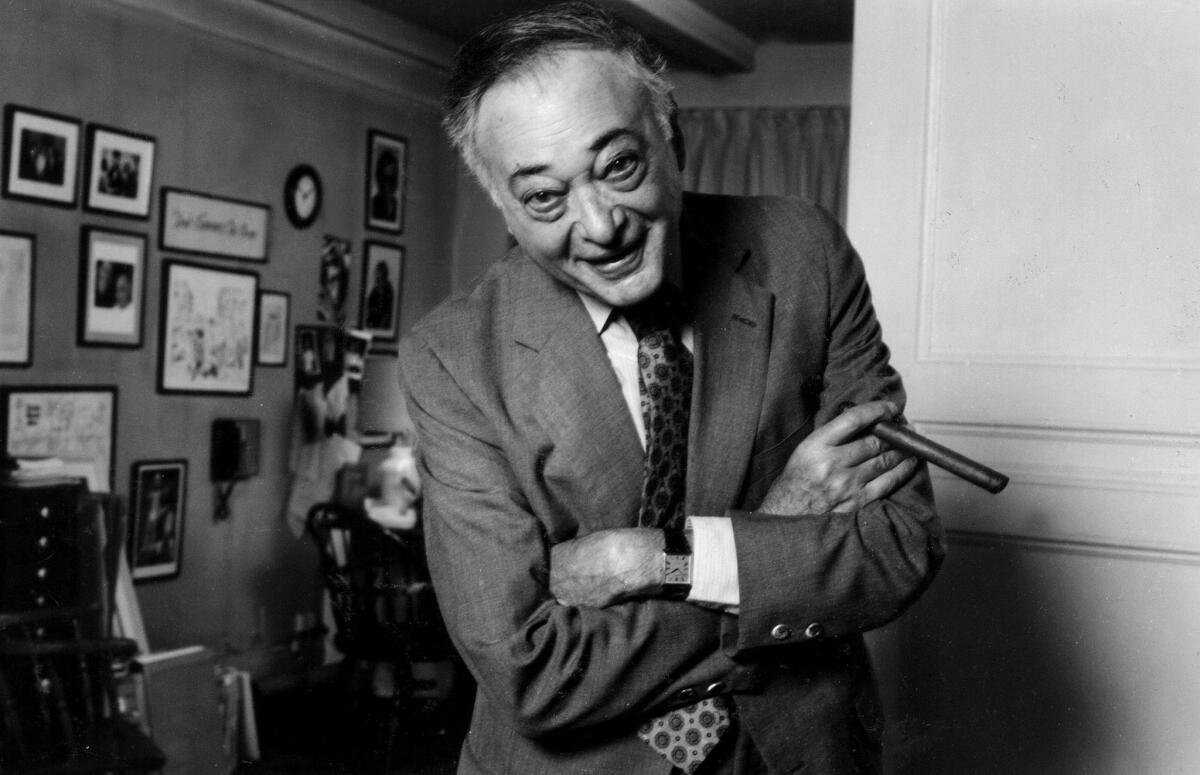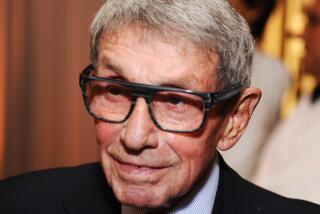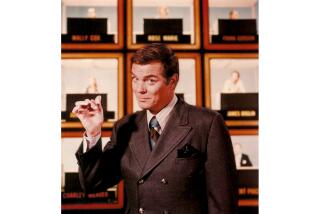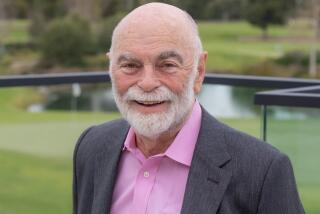Jack Rollins dies at 100; legendary manager had long comedy client list

Jack Rollins, shown in 1990, played key roles in the careers of many top comedians, including Woody Allen, David Letterman, Robin Williams and Robert Klein.
Legendary talent manager Jack Rollins’ client list played a key role in defining comedy in the last half of the 20th century and beyond.
Woody Allen, David Letterman, Robin Williams, Joan Rivers, Billy Crystal, Mike Nichols, Elaine May, Paula Poundstone, Martin Short, Robert Klein — all were on his roster at one point or another.
Along the way, Rollins helped create the role of the modern show business manager.
“When I went into this business in 1946,” he said in a 1988 Chicago Tribune interview, “there weren’t managers. There was Milton Berle’s mother.”
Rollins, 100, died Thursday of natural causes at his home in New York City, said his daughter, Susan.
Rollins and his longtime business partner, Charles Joffe, who died in 2008, liked to find young talent to nurture. Rollins, Rivers told the Tribune in 1986, “could take a grain of sand and make it into an industry.”
That was never more true than with Woody Allen, who came to Rollins’ Manhattan office in the late 1950s because he wanted to write for Nichols and May, the hip comedy act of the era. That wouldn’t work out because the duo created their own material, but Rollins and Joffe saw something in the young TV writer.
“He’d be dead serious when he read a sketch of his, but it hit us funny,” Rollins told the New York Times in 1985. “He didn’t know why we were laughing. He’d give a ‘what’s so funny?’ look.”
They encouraged the deadpan Allen to do stand-up. It was painful at first.
“The first 18 months as a stand-up comedian were horrendous,” Rollins said in the 1986 Tribune interview. “He was the worst comedian you can possibly imagine — zero grace as a performer.”
Finally the tide turned. “He got a smile, then a laugh, and then a cult.”
Allen never forgot the manager who stuck by him. He continued to list Rollins as a producer on his films — including “Irrational Man,” scheduled to be released next month — long after the manager retired.
“Jack had not been involved with his films for many years,” Robert Weide, director of the 2012 film “Woody Allen: A Documentary,” said in an interview Thursday. “I’m not sure if they even talked much.”
Weide asked Allen why he continued to give Rollins the credit. “Because without Jack,” Allen told him, “I wouldn’t have a career.”
On Thursday, Allen issued a statement on Rollins: “He was one of the very few people in my life who lived up to the hype about him. All the stories about how great Jack Rollins was are true.”
Rollins was born Jacob Rabinowitz on March 23, 1915, in Brooklyn. He graduated from Thomas Jefferson High School and earned a degree at City College of New York. But he wasn’t aiming for a show business career in particular, according to his daughter Francesca.
“He didn’t know what he wanted to do,” she said. “He knew he couldn’t do a normal job. He had to find something where he could stay up late, and get up late and not require him to punch a clock. That wasn’t his style.”
The answer came when he was in the Army during World War II, stationed on a base in India. He got involved in a satirical revue about Army life and decided show business was his calling.
Back in New York after the war, he was looking for plays to produce without much luck when he became a manager by “sheer accident,” Rollins was quoted as saying in the 1991 book “The Compass,” about the improv group that gave Nichols and May their start.
“I was strolling in the Village courting my wife,” he said. “We peered into the window of a tiny restaurant, and there was Harry Belafonte, flipping hamburgers.” Rollins’ soon-to-be wife, Jane, recognized Belafonte as a struggling pop singer seeking to switch to folk music. Belafonte became Rollins’ first major client. He helped forge a new image for the singer, leading to early successes.
The two had a bitter falling-out after a few years, but Rollins had earned a reputation as a manager who had solid instincts when it came to building careers.
Rollins and Joffe were known for taking on only a few clients at a time. Eventually, Joffe worked almost solely with Allen and Rollins focused on Letterman. Rollins was listed as executive producer on the NBC show “Late Night with David Letterman” from 1983 to 1991.
For all his influence on comedy, Rollins — who had a rumpled look and often sported a cigar — was known as someone who couldn’t tell a joke. But there were funny stories about him, including one that Billy Crystal told the Tribune in 1986.
Crystal was doing stand-up in 1974 when Rollins came to see him in a Manhattan club. After the performance, a nervous Crystal offered Rollins a ride home, which turned out to be even more nerve-wracking because the manager spent the drive criticizing his act. Finally, they reached Rollins’ home.
“He got to his door,” Crystal said, “and he headed back to my car. I thought he was going to say something like, ‘I thought you were terrific’ or ‘I didn’t mean to hurt your feelings,’ but he said to me, ‘Would you mind taking me back? I just realized I drove over there tonight and I left my car.’”
On Thursday, Crystal said in an email: “Jack’s notes on my work always meant everything to me. To me he was a real giant.”
Rollins’ wife, Jane, died in 2012. He is survived by daughters Susan, Francesca and Hillary, and four grandchildren.
david.colker@latimes.com
More to Read
Start your day right
Sign up for Essential California for the L.A. Times biggest news, features and recommendations in your inbox six days a week.
You may occasionally receive promotional content from the Los Angeles Times.







